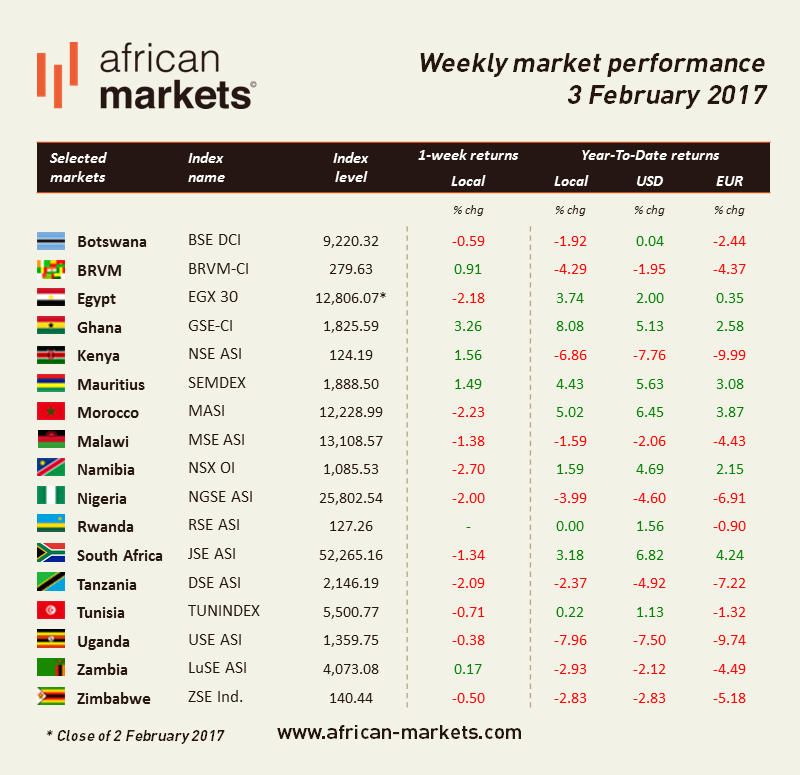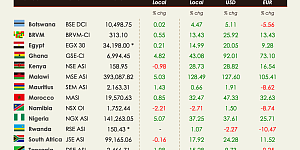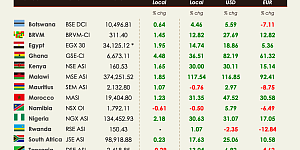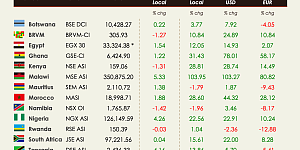In Zimbabwe, Econet shares plunged overnight as the company announced its intention to raise US$130 million through a rights issue at a significantly discounted price i.e. US$0,05 at a time the company's share price was trading at US$0,30. Econet plans to use the proceeds to extinguish a debt. Econet owes US$13,2 million to China Development Bank, US$75 million to Ericsson Credit AB, US$15 million to African Export and Import Bank (Afrexim) and around US$6 million to the Industrial Development Corporation (South Africa). In the meantime, there seem to be tensions between the company and the ZSE as the ZSE raised eight problems regarding the rights issue that needed clarification and that Econet has not addressed yet. In parallel, Zimbabwe introduced a 15% value added tax on several basic foodstuffs on 1st February 2017. The new tax may result in prices increasing by 15%. Formal retailers may lose consumers to informal ones to avoid paying higher prices. The ZSE Ind. decreased by 0.50%.
The NGSE ASI lost 2%. According to the Nigerian National Petroleum Corporation, more than $500 million has been saved through the Direct Sale of Crude Oil and Direct Purchase of Products (DSDP) programme. As per the NNPC spokesperson, a bit less than 128 Indigenous and International Oil and Gas companies have indicated interest to participate in the programme. The DSDP programme was launched last year and is carried out through direct sales of crude oil to refiners or consultants, who in turn supply NNPC with equivalent worth of products. In parallel, the Nigerian Federal Executive Council approved a new tax policy targeted at luxury goods. This week, the National Bureau of Statistics released key 2016 economic data. Unsurprisingly, the country’s capital imports reached a nine-year low in 2016 and fell to $5.12 billion from $9.64 billion in 2015. In the same vein, Nigeria’s Foreign Direct Investment decreased by $402.6 million in 2016.
The USE ASI lost 0.38%. Uganda is suffering from a drought which has sent the price of certain goods to unseen levels. The dry spell has harmed food crop production which led to an increase in food price due to the condensed supply from the farms to the market. According to the country’s Bureau of Statistics, annual headline inflation rose to 5.9% for the year ending January 2017, from 5.7% in the previous year. The annual food crops inflation reached 14.5% for the year ending January 2017 from 10.8 % the year before.
The Central Bank of Kenya has informed that it expects the economy to contract to 5.7% in 2017 from 5.9% last year as a result of drought, Trump policies and Brexit. The drought has already led to increased food prices and water shortage. The country’s National Bureau of Statistics said inflation rose to 6.99% in January from 6.35% in December. This comes in a wider context of uncertainty in Kenya due to the election year and the slowdown in credit to the private sector. In this regard, the CBK kept its policy rate at 10% this week with inflation expected to remain between 2.5% and 7.5% and the shilling relatively stable to the US dollar. Current account deficit has narrowed which has eased pressure on the shilling. Keeping the rate unchanged also means that the interest rates charged by commercial banks will continue to be capped at 14%, in line with the government-backed banking policy that caps rates at 4% above the policy rate. The NSE ASI gained 1.56%.










































